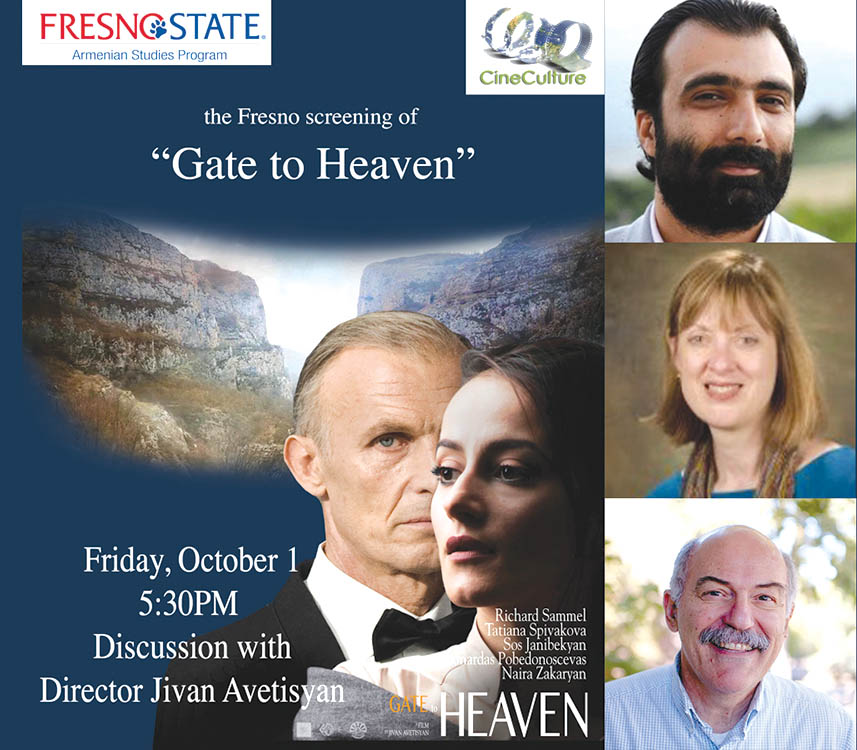
Sara Beberian
Staff Writer
Imagine a huge, beautiful canyon, with birds flying through it, and the wind whistling through the distance. This was an everyday reality for Sophia Marti (Tatian Spivakova), who grew up in a home overlooking a canyon in Artsakh that her family nicknamed the “Gate to Heaven.” The name was fitting, as the canyon was so beautiful and “filled with such an energy” that it made the young Marti want to fill the canyons with music and song. However, despite this indescribable beauty and atmosphere, she could not be at peace because her home was in Artsakh, which had been plagued by wars and unrest for years.
Prominent Armenian film-maker Jivan Avetisyan, who directed “Gate to Heaven,” is no stranger to the topic of Artsakh. In fact, Avetisyan was raised in Artsakh and has grown up witnessing the constant unrest in the region. This did not prevent him from following his dream to become a filmmaker.
With a creative passion for filmmaking, Avetisyan attended and graduated from the Yerevan Institute of Cinematography and Theatre. He has produced over twenty works, including “Tevanik” and “The Last Inhabitant,” which he discussed with Fresno State students last year.
On Friday, October 1, 2021, Avetisyan joined Fresno State students and community members in a virtual discussion of “Gate to Heaven” as part of the CineCulture class and film series. CineCulture Prof. Mary Husain and Prof. Barlow Der Mugrdechian led the discussion with Avetisyan. Executive Producer Adrineh Mirzayan also offered her insight on the production of the film.
“Gate to Heaven” is the story of Sophia Marti, an Artsakh native and opera singer, and her relationship with Robert Sternvall (Richard Sammel), a German war photographer. Sternvall had met Marti’s father, photographer Edgar Martirosyan, while covering the war in Artsakh in 1992. The films has several plot twists which bring the opera star and German photographer together romantically before revealing several secrets. As the film progresses, one becomes engrossed in a compelling story, told with layers that even the characters do not understand from the beginning.
During the discussion, students had the opportunity to consider many aspects of the film with Avetisyan, who was able to shed light on some of the more important details. Since portions of the film were recorded in Artsakh, the question of safety was a major concern.
Avetisyan stressed the point that war and the possibility of war are a constant looming threat to the Armenians who live in Artsakh, and this is not something that only the filmmakers worry about. He emphasized that, “war can happen to anyone at any time,” and that we must not think of war as a “faraway concept.”
One of the main characters in the film is Sophia, who has lived in tumultuous times for more than twenty-five years. The Karabagh war took the life of her father, and the 2016 war uprooted her whole life. Avetisyan explained that for the characters in the movie, the “Gate to Heaven” represented dealing with their past traumas and moving through the gate towards a brighter future.
Avetisyan explained that people have the opportunity to do the same in their own lives every day. Avetisyan’s films reflect important stories that are full of truth and reflect real life.
When asked about the main message of the film, Avestisyan stated that it is a “message of peace.” All people and all countries must feel a responsibility to protect and promote peace, not only for the Armenians in Artsakh but around the world.
Unfortunately, it seems that for the natives of Artsakh that war is always a part of their lives. Avetisyan, having lived in Artsakh, was able to authentically capture these real life situations and suffering that Armenians in Artsakh go through.
Avetisyan’s films are a success because they are personal and real.
 Hye Sharzhoom Armenian Action
Hye Sharzhoom Armenian Action